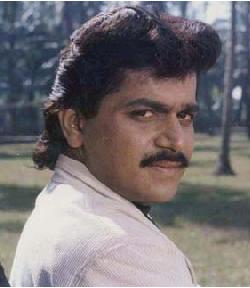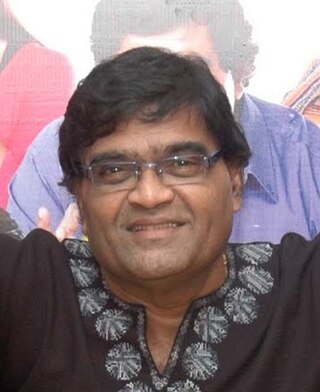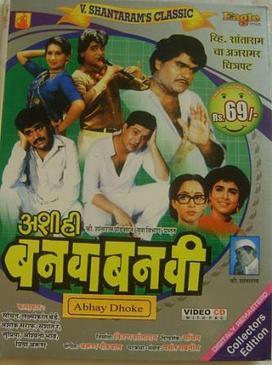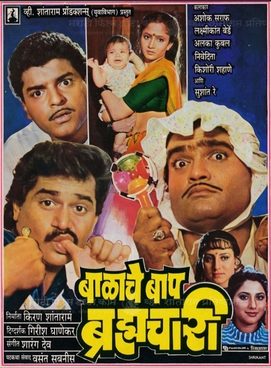
Laxmikant Berde was an Indian Marathi language film actor who appeared in Marathi and Hindi movies. Known for his highly energetic slapstick performances, Berde started his career as an employee in the production company Mumbai Marathi Sahitya Sangh and then played supporting roles in a few Marathi stage plays. In 1983–84, he first became famous with the Marathi play Tur Tur.

Ashok Saraf is an Indian actor and comedian, known for his work in Marathi and Hindi films along with theatre in both languages. Saraf has received several awards including eleven Maharashtra State Film Awards and four Filmfare Awards Marathi. He is referred to as the Mahanayak, Ashok Samrat or Mama of the Marathi film industry. in 2016 He Received Filmfare Marathi Lifetime Achievement Award For His Contribution in Marathi Cinema. In 2023, he received the Maharashtra Bhushan, the highest civilian honour in the Indian state of Maharashtra.
Priya Arun Berde is an Indian actress who has worked in several Marathi language films. She is the wife of the actor Laxmikant Berde and is the daughter of actress Lata Arun. She joined Bharatiya Janata Party in 2023.

Sachin Pilgaonkar, often known mononymously by his screen name Sachin, is an Indian actor, director, producer, writer and singer of Marathi and Hindi films. He has directed and acted in several Marathi films of the late 1980s and early 1990s. He has received several awards including four Maharashtra State Film Awards, two National Film Awards and two Filmfare Awards Marathi.

Marathi Cinema, also known as Marathi film industry, is the segment of Indian cinema dedicated to the production of motion pictures in the Marathi language widely spoken in the state of Maharashtra. It is based in Mumbai. It is the oldest film industry of India and one of the leaders in filmmaking in the Indian film industry.
Ranjana Deshmukh was an Indian actress known for her work in several popular Marathi films productions in 1970s & '80s. She won Filmfare Marathi for Best Actress and Maharashtra State Film Award for Best Actress for two times each.

Ashi Hi Banwa Banwi is a 1988 Indian Marathi-language comedy buddy film directed by Sachin Pilgaonkar and produced by Kiran Shantaram under the production banner of V. Shantaram Productions. Widely regarded as one of the greatest comedy films in Marathi cinema industry, it stars an ensemble cast of Ashok Saraf, Sachin Pilgaonkar, Laxmikant Berde, Siddharth Ray, Ashwini Bhave, Supriya Pilgaonkar, Priya Arun, Nivedita Joshi, Nayantara, Viju Khote, and Sudhir Joshi.

Gammat Jammat is a 1987 Indian Marathi-language comedy film written by Shantaram Nandgaonkar, directed by Sachin Pilgaonkar and produced by Satish Kulkarni under the production banner of Shree Tulsi Productions. The film stars an ensemble cast of Ashok Saraf, Sachin Pilgaonkar, Varsha Usgaonkar, Charusheela Sable, Shrikant Moghe, Ashalata Wabgaonkar, Viju Khote, Satish Shah and Sudhir Joshi. The music was composed by Arun Paudwal.

Siddharth Ray was an actor in Hindi and Marathi films. He also appeared in a few south Indian films. He was the grandson of filmmaker V. Shantaram and maternal cousin of Durga Jasraj.

Navra Maza Navsacha is a 2004 Indian Marathi-language slapstick film directed and produced by Sachin Pilgaonkar, is considered as cult classic in Marathi cinema. The film stars Sachin Pilgaonkar, Supriya Pilgaonkar and Ashok Saraf. The film portrays the journey of the couple from Mumbai to Ganpatipule to fulfill a vow.

Bhutacha Bhau is a 1989 Indian Marathi-language drama film directed by Sachin Pilgaonkar and produced by Shailendra Singh. The film stars Ashok Saraf, Sachin Pilgaonkar, Varsha Usgaonkar, Jayram Kulkarni and Laxmikant Berde in lead roles. It was theatrically released on 21 March 1989.

Balache Baap Brahmachari is a 1989 Indian Marathi-language comedy-drama film written by Vasant Sabnis, directed by Girish Ghanekar and produced by Kiran Shantaram under the production banner of V. Shantaram Productions. The film stars an ensemble cast of Ashok Saraf, Laxmikant Berde, Siddharth Ray, Kishori Shahane, Nivedita Joshi, Alka Kubal, Kanchan Adhikari and Sudhir Joshi. The plot is loosely inspired by Three Men and a Baby (1987) of Leonard Nimoy, which itself was based on French film Three Men and a Cradle (1985).
Abhinay Berde is an Indian actor who works in Marathi films. The son of Marathi actor Laxmikant Berde, he made his debut with Ti Saddhya Kay Karte and won the Filmfare Award Marathi and the MFK Award for best debut (male).

Aayatya Gharat Gharoba is a 1991 Indian Marathi-language musical comedy film directed and produced by Sachin Pilgaonkar. The film stars an ensemble cast of Ashok Saraf, Sachin Pilgaonkar, Supriya Pilgaonkar, Laxmikant Berde, Rajeshwari Sachdev, Prashant Damle and Kishori Shahane. The film is loosely based on 1948 Hindi film Pugree which was remade in 1972 as Dil Daulat Duniya.

Ashi Hi Aashiqui is a 2019 Indian Marathi-language romantic drama film written and directed by Sachin Pilgaonkar, featuring Abhinay Berde and Hemal Ingle in the leading roles. The film is produced by T-Series, Moving Pictures and Sushriya Chitra.
Hemal Ingle also known as Hemal Dev is an Indian actress and model primarily works in Marathi films. She made her debut in 2018 with the Telugu film Husharu and lead actress in Marathi films like Ashi Hi Aashiqui (2019), Roop Nagar Ke Cheetey (2022), Unaad (2023), Navra Maza Navsacha 2 (2024).

"Hridayi Vasant Phulatana" is an Indian Marathi-language song from the soundtrack of the 1988 film Ashi Hi Banwa Banwi. It was composed by Arun Paudwal, with lyrics penned by Shantaram Nandgaonkar and vocals provided by Suresh Wadkar, Anuradha Paudwal, Sudesh Bhosale, Shailendra Singh, Sachin Pilgaonkar, and Aparna Mayekar.

Ashok Saraf is an actor mainly working in Marathi and Hindi cinema. He is known as the "King of Marathi Film Industry".
"Ashwini Ye Na" is a Marathi song from the 1987 film Gammat Jammat, performed by Kishore Kumar, marking his debut in Marathi music. The song features Ashok Saraf and Charusheela Sable on screen and became a massive hit, widely regarded as one of the finest tracks in Marathi cinema.














